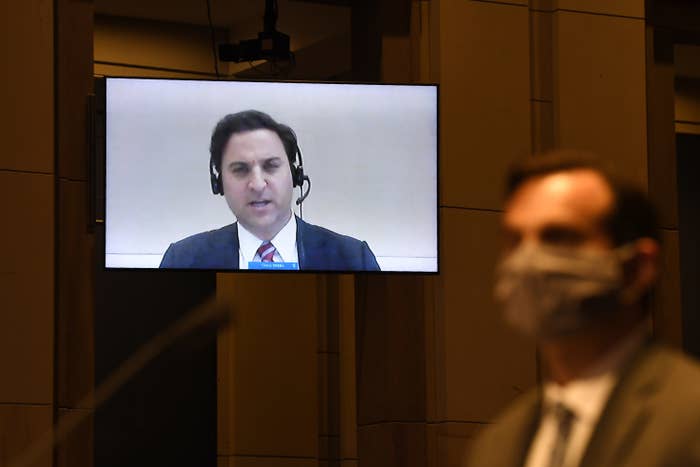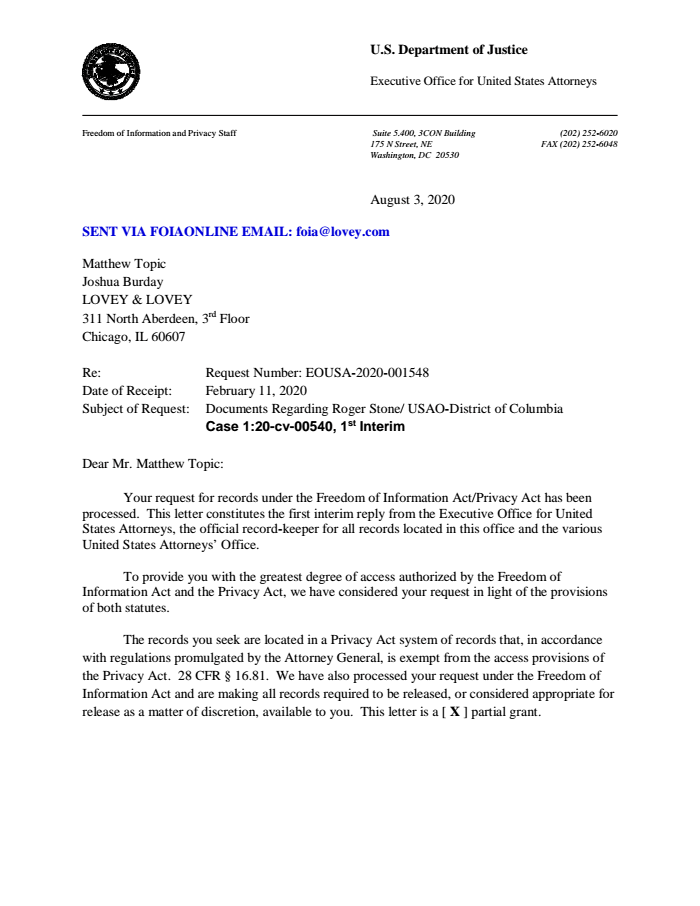
WASHINGTON — At 2:59 p.m. on Feb. 11, Aaron Zelinsky, one of the lead prosecutors in the criminal case against Trump ally Roger Stone, sent an email notifying his supervisor J.P. Cooney that he was withdrawing from Stone’s case.
In an email one minute later, according to the time stamp, Cooney tried to stop him.
“I am not approving of you withdrawing from this case right now,” Cooney wrote in one of a set of emails obtained by BuzzFeed News through a Freedom of Information Act lawsuit.
Cooney was too late — Zelinsky had filed his withdrawal from the Stone case with the federal district court in Washington. Three minutes after his email to Cooney, Zelinsky wrote to two assistant US attorneys in Maryland to say that he didn’t think Cooney could force him to continue working on Stone’s case; his email made clear he’d consulted with them in advance about his decision.
“As we have discussed, I do not believe that he has the power to compel me to stay in the case,” Zelinsky wrote.
The emails to and from Zelinsky offer new perspective on the flurry of activity that took place behind the scenes after the Justice Department stepped in to overrule its own prosecutors, including Zelinsky, and recommend a lesser sentence for Stone, Trump’s ally and former campaign adviser.
The Stone prosecutors had initially recommended that Stone serve seven to nine years in prison for lying to Congress in the Russia investigation and witness tampering, but the Justice Department led by Attorney General Bill Barr walked back that suggestion in court, a rare move that followed a Twitter campaign from the president complaining of a “very unfair situation” for Stone. Zelinsky was the first of four prosecutors on the case to withdraw in the wake of DOJ’s filing.
The 76 pages of partially redacted emails were turned over to BuzzFeed News by the Executive Office of US Attorneys. The agency withheld 152 pages in releasing the emails Monday and indicated some of those records are sealed and others were referred to the FBI for review. The Justice Department intends to make additional monthly productions of emails and other documents related to how the Justice Department handled Stone’s case.
The prosecution team filed its original sentencing memo for Stone on Feb. 10. Zelinsky testified before the House Judiciary Committee in June that in the days leading up to that filing, he learned that “leadership” in the US attorney’s office in Washington, which took over the Stone case after special counsel Robert Mueller ended his investigation, was pressuring the prosecution team to seek a less severe punishment.
Zelinsky testified that a supervisor told him that the interim US attorney leading the office at the time, Timothy Shea, wanted to give Stone special treatment because Shea was “afraid of the president.” After the prosecutors filed their original sentencing memo, Trump publicly protested, tweeting that it was a “miscarriage of justice.” The judge ultimately sentenced Stone to 40 months in prison, but Trump commuted that sentence last month, shortly before Stone was set to report to the Bureau of Prisons.
Shea had been in charge of the DC office for a week when the sentencing memo was filed — he’d been appointed by Barr to temporarily take over as interim US attorney effective Feb. 3; Shea’s previous job had been as a counselor to Barr. Shea is currently serving as acting administrator for the Drug Enforcement Administration.
The emails produced to BuzzFeed News don’t include any messages between Zelinsky and Shea. But Zelinsky did exchange emails with Shea’s chief of staff, David Metcalf. At 2:05 p.m. on Feb. 10, Metcalf wrote to Zelinsky: “If you actually want to talk, let me know.” The rest of Metcalf’s message is redacted.
“What would you like to discuss? I am a bit busy because of Stone sentencing memo (as I’m sure you’re aware),” Zelinsky replied one minute later. The second half of his email is redacted.
While that exchange was taking place, Zelinsky was also trading emails with Jonathan Lenzner, an official in the US attorney’s office in Maryland. The contents of those emails are fully redacted, but the subject line reads, “Re: Looks like they are blinking.” Zelinsky is an assistant US attorney in Maryland; he had been part of Mueller’s team, and then was specially detailed to the DC office to continue working on the Stone case.
At 3:58 p.m., it appears Zelinsky and Metcalf hadn’t connected yet, because Zelinsky emailed Metcalf to say that he was leaving and could talk by phone. The documents produced to BuzzFeed News don’t indicate if the two men spoke.
The Stone prosecution team filed their sentencing memo that evening. Zelinsky told the House Judiciary Committee that he had told “leadership” in the US attorney’s office that he would withdraw “rather than sign a memo that was the result of wrongful political pressure,” and that the prosecution team eventually got approval to file their recommendation.
At 1:48 a.m. on Feb. 11, Trump published his tweet calling the recommendation a “miscarriage of justice.” Later in the morning, Zelinsky testified that the prosecutors learned about media reports that DOJ planned to file a new sentencing recommendation.
The emails provided to BuzzFeed News show that at 12:06 p.m., Michael Marando, another one of the lead prosecutors in Stone’s case, emailed Cooney about a tweet from a Fox News reporter that the Justice Department would be changing its sentencing recommendation for Stone.
“FYI,” Marando wrote in his message to Cooney. One minute later, Cooney replied to Marando, “False.” Twenty seconds later, according to the timestamps on the emails, Marando forwarded Cooney’s response to Zelinsky.
Five minutes later, Zelinsky replied to Marando and another lead Stone prosecutor, Jonathan Kravis, with a tweet from a CNN reporter that mirrored the Fox News tweet, quoting an unnamed Justice Department official criticizing their sentencing recommendation as “extreme and excessive” and “grossly disproportionate to Stone’s offenses.”
Marando, Kravis, and the fourth member of the team, Adam Jed, withdrew from the case on Feb. 11 along with Zelinsky.
After news broke that the prosecution team had withdrawn, Zelinsky received a message of encouragement from another assistant US attorney in Maryland, P. Michael Cunningham: “Very proud of you!”
“Thanks! Just doing what any of us would have done in the same circumstance,” Zelinsky replied.
The final email provided to BuzzFeed News Monday shows Zelinsky appearing to take a jab at Shea the morning after prosecutors filed their sentencing recommendation. Zelinsky, Marando, Kravis, and Jed, along with Shea, had received a profanity-laced email shortly after 9 a.m. on Feb. 11 from a person whose name is redacted that was critical of the prosecution’s original sentencing recommendation.
“Good news,” Zelinsky wrote to Marando, Kravis, and Jed, “we know the U.S. Attorney won’t get this threat because he doesn’t use email.”
Zelinsky and a spokesperson for the US attorney’s office in DC did not immediately return requests for comment.
Stone sent BuzzFeed News a statement in response to the release of Zelinsky's emails, writing that Zelinsky "needs to stop pretending he is a 'non-political career line prosecutor'" and pointing to Zelinsky's previous experience working in the State Department during the Obama administration. As an assistant US attorney, Zelinsky is a career employee of the Justice Department and is not a political appointee.
Stone reiterated his contention that the government's original sentencing recommendation of seven to nine years in prison was "excessive." He is continuing to appeal his conviction after having his prison term commuted.
UPDATE
Updated with comment from Roger Stone.



